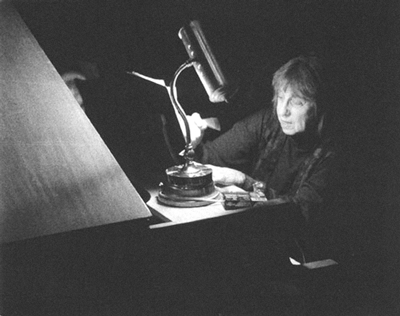By Michael Clive
Few cultural clichés are more durable or romantic than the musician making sacrifices for art. The movies show him shivering in a Parisian garret with soot-rimmed skylights. But in real life, the setting is a cramped two-bedroom on the Lower East Side stacked with cartons of files, recordings and annotated scores. And the musician is a woman – pianist-conductor-teacher-impresariat Mimi Stern-Wolfe – who has been making beautiful music happen Downtown for more than 30 years.
“Music & Satire: Notes from the Underground” is a timely example of her work. This latest concert from Stern-Wolfe’s Downtown Music Productions comes to St. Marks in the Bowery this Sunday, June 18, with fascinating musical rarities including “Music for a Farce” by Paul Bowles and a piano film score by Erik Satie. As usual, Stern-Wolfe programmed, did the publicity, and will take the piano parts. It’s tempting to call her tireless, but she’s tired; she just doesn’t let it stop her. Through good years and bad, she keeps going despite the low pay, and lack of recognition. Only the music is rich. “It’s a hell of a way to live,” she says. “I wouldn’t recommend it to anybody.”
If Stern-Wolfe is so good, why isn’t she famous? One reason is loyalty to the Downtown community. “It’s almost a silly little revenge thing,” she says. “I didn’t want to go to the Upper West Side every time I went to a concert, so I made a vow to bring the music down here. If I’d lived Uptown, life would’ve been very different. Perhaps I’d have a job with City Opera. Something like that.”
Instead, her life has been filled with what she ruefully calls “26-hour workdays” as she seeks the gigs and grants for Downtown Music Productions. “In some years I’ve had a part-time development director, or even a full-timer and a little staff to share the load, always working out of this apartment. Right now, it’s just me. Look around,” she says with the seasoned conductor’s inclusive yet pointed gesture that indicates tutti – everything. “What you see is proposals, files, all the things the nonprofit world is full of with people like me looking for money constantly. It’s what I call finagling and hustling. It’s what kept us going all these years. I’ve got boxes of music, but not furniture.”
A graduate of the old High School of Music and Art, Stern-Wolfe went to Queens College, where New Yorkers with less than Ivy-League budgets could find top-flight academics. The music department remains one of the school’s special strengths, and Stern-Wolfe became the college orchestra’s solo pianist. Later on she took the conservatory route, completing a master’s in classical studies at the hallowed New England Conservatory of Music. But not before a musical pilgrimage to Paris for instruction with the 20th century’s most celebrated pedagogue of piano, theory, analysis and composition, Nadia Boulanger.
The list of Americans who apprenticed themselves to the sisters Boulanger in their famously rigorous two-woman atelier includes the most famous American composers of their day. Copland, Bernstein, Thomson and Gershwin all had fabled associations with Nadia, who – despite her benevolently tyrannical belief in a right way of hearing and playing music – nurtured the uniquely individual voice within each student. Whether or not Boulanger strengthened her student’s commitment to community music and social causes, Stern-Wolfe was early in adopting 1960s-style progressivism. And she hasn’t wavered since.
“When I came back from Paris in 1963,” she ways, “I already knew I wanted to bring classical music to community audiences. I just wasn’t sure how. But I felt it was a way to give back. That was more important to me than the idea of playing at Lincoln Center, where you have to be 20 years old and win a contest to get a foothold.”
In the competitive, ego-driven world of classical music stardom, this kind of attitude is eccentric or downright subversive, but it has informed Stern-Wolfe’s entire career in teaching and production, which ranges from children’s music to very sophisticated adult fare. “Teaching children’s opera over on Third Street, that was wonderful. We took the music and staging into public schools. That’s how I developed the Children’s Downtown Musical Theatre.” That was back in 1977. In 1979, her Downtown Chamber and Opera Productions became Downtown Music Productions as we know it today.
Over the years, Stern-Wolfe’s productions have hewed to compelling social themes: annual AIDS concerts, “War and Pieces” on the consequences of war, “Musecology” on environmental issues, Holocaust remembrances. In the hands of a lesser programmer or musical director, the resulting concerts could smack of musical tourism or dilettantism. But these kinds of themes have always been among composers’ highest concerns, and under Stern-Wolfe’s musical direction the concerts are beautifully anthologized and played across a wide range of styles.
Indeed, it was this consistently high quality of execution that first alerted me to one of Stern-Wolfe’s strangest eccentricities – the apparent lack of a performer’s ego. “From what I’ve heard so far,” I told her, “there’s nothing you can’t play.” Anyone else might have justifiably gloated a bit or mentioned other critical accolades. And she’s got them to mention. Instead, she shrugged. “I’m a classically trained pianist,” she said. “With that kind of education, you should be able to play anything. If you’re any good.”
East Village residents – in fact, all of lower Manhattan – should be gratified that Stern-Wolfe is very good indeed.
“Music & Satire: Notes from the Underground” is at St. Mark’s in the Bowery, Tenth Street at Second Avenue, this Sunday, June 18th at 3 pm. A contribution of $10 to $15 is suggested. For further information, contact downtownmusicproductions.org or 212-477-1594.





































